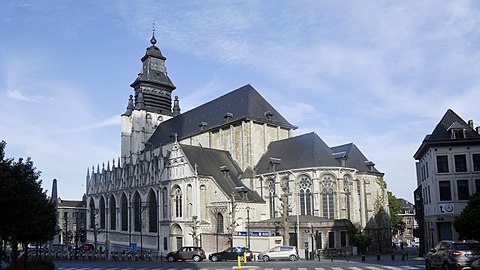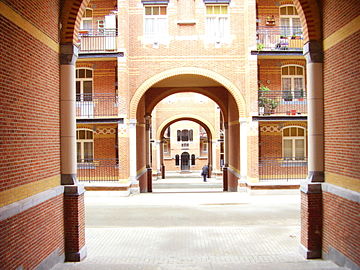Marollen
Marollen
| |
|---|---|
Neighbourhood | |
 | |
| Coordinates: 50°50′13″N 4°20′46″E / 50.83694°N 4.34611°E | |
| Country | Belgium |
| Region | Brussels-Capital Region |
| Municipality | City of Brussels |
| Time zone | UTC+1 (CET) |
| • Summer (DST) | UTC+2 (CEST) |
| Postal code | 1000 |
| Area codes | 02 |
| Website | Official website |
The Marolles (French, pronounced [maʁɔl] ⓘ) or Marollen (Dutch, pronounced [maːˈrɔlə(n)]) is a popular historic neighbourhood of downtown Brussels, Belgium. It is situated between the Palace of Justice to its south-east, the Chapel Church to its north and the Halle Gate to its south.[1] Its inhabitants are called Marolliens in French and Marollianen in Dutch.
Lying at the heart of the Marolles are the Place du Jeu de Balle/Vossenplein, home to the Old Market, and the Cité Hellemans collective housing complex. Major arteries of the district include the Rue Haute/Hoogstraat, the Rue Blaes/Blaesstraat and the Rue des Tanneurs/Huidevetterstraat. This area is served by Brussels-Chapel railway station and Brussels-South railway station, as well as by the metro and premetro (underground tram) station Porte de Hal/Hallepoort on lines 2, 3, 4 and 6.
The traditional Brabantian dialect of Brussels (known as Brusselian, and also sometimes referred to as Marols or Marollien) was widely spoken in the Marolles until the 20th century.[2] It still survives among a small minority of inhabitants called Brusseleers[2] (or Brusseleirs), many of them quite bi- and multilingual in French and Dutch.[3][4]
History
[edit]Early history
[edit]The area now occupied by the Marolles lay, during the Middle Ages, in the first circumvallation of Brussels. The first mention of a Walsche Plaetse (1328), literally "Walloon Place", probably indicates an early presence of French-speaking traders and craftsmen in the neighbourhood, as it was a logical arrival place for migrants from the south.[5] In 1405, a fire broke out in the neighbourhood and destroyed some 2,400 homes.[6]
At the end of the 16th century, the part of the Marolles crossed by the Rue des Minimes/Minimenstraat, called Bovendael at that time,[7] was frequented by prostitutes.[8] Lepers were also exiled to this area, and from 1691, they were cared for by the Apostoline sisters, a religious congregation from which the toponym Marolles is thought to be derived (from Mariam Colentes in Latin ("those who honour the Virgin Mary"), later contracted to Maricolles/Marikollen, and finally Marolles/Marollen).[9][10] The sisters' presence was short-lived, as they relocated in 1715 to the Quai au Foin/Hooikaai in the Quays or Maritime Quarter. Their name, however, remained attached to their old district, with the current Rue de Montserrat/Montserratstraat being called Op de Marollen in Brusselian.[11]
In the 17th and 18th centuries, the nobility and the bourgeoisie of Brussels built mansions along the Rue Haute/Hoogstraat.[12] The Marolles became a working class district in the succeeding centuries.
19th century
[edit]
In 1860, during the reign of King Leopold I, a royal decree announced the construction of a new Palace of Justice (the old one located on what is today the Place de la Justice/Gerechtsplein having quickly deteriorated and exceeded its capacity), and an international architectural competition was organised for its design.[13] After several failed proposals, the then-Minister of Justice Victor Tesch appointed the architect Joseph Poelaert to draw plans of the building in 1861.[14] The first stone was laid on 31 October 1866,[15] and the building was inaugurated on 15 October 1883, four years after Poelaert's death in 1879.[16][17] The Palace's location is on the Galgenberg hill (French: Mont aux potences; "Gallows Mount"), where in the Middle Ages convicted criminals were hanged, hence its name.[18]
For the Palace of Justice's construction, a section of the Marolles was demolished, while most of the park belonging to the House of Merode was also expropriated.[19] The 75 landlords belonging to the nobility and the high bourgeoisie, many of whom lived in their homes,[20] received large indemnities, while the other more modest inhabitants, about a hundred, were also forced to move by the Belgian Government, though they were compensated with houses in the Tillens-Roosendael garden city (French: cité-jardin Tillens-Roosendael) in the Quartier du Chat in the Uccle municipality.[21]
Poelaert himself resided in the Marolles, only a few hundred metres from the building, on the Rue des Minimes, in a house adjoining his vast offices and workshops and communicating with them.[22][23] It is thus unlikely he saw himself as ruining the neighbourhood. Nonetheless, many angry citizens personally blamed Poelaert for the forced relocations, and the expression schieven architect (meaning "shameful architect") became one of the most serious insults in the dialect of the Marolles.[18]
20th and 21st centuries
[edit]
Many Jews resided in the neighbourhood before the first Nazi arrests and deportations in the summer of 1942. Many of them had arrived there after fleeing the pogroms that accompanied the 1905 Russian Revolution, with others following between 1933 and 1938, after Hitler's accession to power in Germany. At that time, their population was estimated at about 3,000 people. A first synagogue had been built on the Rue de Lenglentier/De Lenglentierstraat, where a commemorative plaque now recalls the deportations. At the end of the war, a mock funeral procession for Hitler was held in the Marolles, during which funds were raised to support the victims of Auschwitz.[24][25]
In some areas of the Marolles, the ensuing poverty left its mark on the urban landscape and scarred the social life of the community, leading to rising crime rates and pervading cultural intolerance. In 2006, riots began in this area.[26] However, from the Place de la Chapelle/Kapellemarkt[27] to the Place du Jeu de Balle/Vossenplein, where a daily flea market known as the Old Market has been held since 1873,[28] along the Rue Haute/Hogestraat and the Rue Blaes/Blaestraat, second-hand and popular shops have for some years given way to antique dealers, marking a profound transformation of the district.[29][30]
Sights
[edit]- The Church of Our Lady of the Chapel or Chapel Church, a Gothic Roman Catholic church dating from the 12th–13th centuries.[31]
- The Halle Gate, the only remaining gate in a series that allowed passage inside the second walls of Brussels.[32]
- The Rue Haute/Hoogstraat, one of the city's longest and oldest streets, follows the course of an old Gallo-Roman road,[29] and runs along Saint Peter's Hospital, which was itself built in 1935 on the site of a leprosium.[33]
- The Palace of Justice, the most important court building in Belgium, also reputed to be the largest building constructed in the 19th century.[17][34]
- The Cité Hellemans, a remarkable example of an early 20th-century collective housing complex, was built to replace the neighbourhood's many squalid cul-de-sacs.[35]
-
Brigittines Chapel
-
Place du Jeu de Balle/Vossenplein, end of a market
-
Cité Hellemans, Rue Blaes/Blaesstraat
See also
[edit]References
[edit]Citations
[edit]- ^ Marollen in Brussel
- ^ a b Evans 2008, p. 71.
- ^ Johan Winkler (1874). "De stad Brussel". Algemeen Nederduitsch en Friesch Dialecticon (in Dutch). Digitale Bibliotheek voor de Nederlandse Letteren. pp. 264–272. Archived from the original on 7 January 2005. Retrieved 16 January 2009.
- ^ Treffers-Daller 1994.
- ^ Bram Vannieuwenhuyze, Brussel, de ontwikkeling van een middeleeuwse stedelijke ruimte, Proefschrift Geschiedenis, Universiteit Gent, 2008, nr. 1.1.693
- ^ Henne & Wauters 1845, p. 181.
- ^ Valérie Verrakete, Histoire du quartier de l'église Notre-Dame de la Chapelle à Bruxelles (XIIème – XVème siècle) (in French), licentiate thesis ULB, 2000, p. 36
- ^ Henne & Wauters 1845, p. 422.
- ^ Henne & Wauters 1845, p. 424.
- ^ Collectif, Les Marolles. 800 ans de luttes. Vie d'un quartier bruxellois (in French), Éditions du Perron, 1988, p. 35
- ^ Jacques Dubreucq, Bruxelles 1000. Une histoire capitale (in French), self-published, 1996, vol. 1, p. 28
- ^ Mardaga 1993, p. 197.
- ^ Vandenbreeden & Loits 2001, p. 14.
- ^ Vandenbreeden & Loits 2001, p. 15.
- ^ Vandenbreeden & Loits 2001, p. 20.
- ^ Vandenbreeden & Loits 2001, p. 32.
- ^ a b Centre, UNESCO World Heritage. "Le Palais de Justice de Bruxelles - UNESCO World Heritage Centre". whc.unesco.org. Retrieved 20 May 2018.
- ^ a b "Palais de Justice" (in French). Belgian federal building registry. 29 September 2009. Archived from the original on 24 February 2011. Retrieved 12 August 2009.
- ^ Vandendaele & Leblicq 1980, p. 270.
- ^ Vandendaele & Leblicq 1980, p. 166: Plan du géomètre Van Keerbergen indiquant les propriétés nécessaires à l'érection du Palais de Justice de Poelaert, 9 février 1863 (A.V.B., T.P., 26.242).
- ^ Quiévreux 1951, p. 257.
- ^ Vandendaele & Leblicq 1980, p. 166.
- ^ Mardaga 1994, p. 466.
- ^ "Zwans, een verzet vermomd in humor". Historiek (in Dutch). 20 December 2022. Retrieved 28 July 2024.
- ^ "De begrafenis van Adolf Hitler – CIRCUIT MAROLLES-MIDI / MAROLLEN-ZUIDSTATION". marolles-jewishmemories.net. Retrieved 28 July 2024.
- ^ "Arrests after riots in Brussels". BBC News. bbc.co.uk. 28 September 2006. Retrieved 29 November 2007.
- ^ "Place de la Chapelle – Inventaire du patrimoine architectural". monument.heritage.brussels (in French). Retrieved 26 October 2023.
- ^ "Place du Jeu de Balle – Inventaire du patrimoine architectural". monument.heritage.brussels (in French). Retrieved 26 October 2023.
- ^ a b "Rue Haute – Inventaire du patrimoine architectural". monument.heritage.brussels (in French). Retrieved 26 October 2023.
- ^ "Rue Blaes – Inventaire du patrimoine architectural". monument.heritage.brussels (in French). Retrieved 26 October 2023.
- ^ Région de Bruxelles-Capitale (2016). "Eglise paroissale Notre-Dame de la Chapelle" (in French). Brussels. Retrieved 28 May 2022.
- ^ "Porte de Hal – Inventaire du patrimoine architectural". monument.heritage.brussels (in French). Retrieved 26 October 2023.
- ^ "Hôpital Universitaire St-Pierre – Inventaire du patrimoine architectural". monument.heritage.brussels (in French). Retrieved 26 October 2023.
- ^ "Palais de Justice – Inventaire du patrimoine architectural". monument.heritage.brussels (in French). Retrieved 26 October 2023.
- ^ "Cité Hellemans – Inventaire du patrimoine architectural". monument.heritage.brussels (in French). Retrieved 26 October 2023.
Bibliography
[edit]- Evans, Mary Anne (2008). Frommer's Brussels and Bruges Day by Day. First Edition. Hoboken, NJ: John Wiley & Sons. ISBN 978-0-470-72321-0.
- Henne, Alexandre; Wauters, Alphonse (1845). Histoire de la ville de Bruxelles (in French). Vol. 1. Brussels: Périchon.
- Quiévreux, Louis (1951). Bruxelles, notre capitale: histoire, folklore, archéologie (in French). Brussels: PIM-Services.
- Treffers-Daller, Jeanine (1994). Mixing Two Languages: French-Dutch Contact in a Comparative Perspective. Berlin: Mouton de Gruyter. ISBN 978-3-11-013837-5.
- Vandenbreeden, Jos; Loits, André (2001). Le Palais de Justice. Bruxelles, ville d'Art et d'Histoire (in French). Vol. 31. Brussels: Éditions de la Région de Bruxelles-Capitale. ISBN 978-2-930457-78-9.
- Vandendaele, Richard; Leblicq, Yvon (1980). Poelaert et son temps (exhibition catalogue) (in French). Brussels: Crédit Communal de Belgique.
- Le Patrimoine monumental de la Belgique: Bruxelles (PDF) (in French). Vol. 1B: Pentagone E-M. Liège: Pierre Mardaga. 1993.
- Le Patrimoine monumental de la Belgique: Bruxelles (PDF) (in French). Vol. 1C: Pentagone N-Z. Liège: Pierre Mardaga. 1994.
External links
[edit] Media related to Marolles/Marollen at Wikimedia Commons
Media related to Marolles/Marollen at Wikimedia Commons- Daily flea market (Voddenmarkt/Marché aux puces) at the Place du Jeu de Balle in the heart of the quarter
- Lewis, Barbara. "From lepers to art lovers, an ever-changing Brussels district." Reuters. Friday August 28, 2015.








